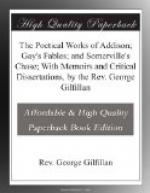The shepherd modestly
replied,
’I ne’er the paths of learning tried;
Nor have I roamed in foreign parts
To read mankind, their laws and arts;
For man is practised in disguise,
He cheats the most discerning eyes;
30
Who by that search shall wiser grow,
When we ourselves can never know?
The little knowledge I have gained,
Was all from simple nature drained;
Hence my life’s maxims took their rise,
Hence grew my settled hate to vice.
The daily labours of the bee
Awake my soul to industry.
Who can observe the careful ant,
And not provide for future want?
40
My dog (the trustiest of his kind)
With gratitude inflames my mind.
I mark his true, his faithful way,
And in my service copy Tray.
In constancy and nuptial love,
I learn my duty from the dove.
The hen, who from the chilly air,
With pious wing protects her care;
And every fowl that flies at large,
Instructs me in a parent’s charge.
50
From nature too I take my rule,
To shun contempt and ridicule.
I never, with important air,
In conversation overbear.
Can grave and formal pass for wise,
When men the solemn owl despise?
My tongue within my lips I rein;
For who talks much, must talk in vain.
We from the wordy torrent fly:
Who listens to the chattering pye?
60
Nor would I, with felonious flight,
By stealth invade my neighbour’s right;
Rapacious animals we hate:
Kites, hawks, and wolves deserve their fate.
Do not we just abhorrence find
Against the toad and serpent kind?
But envy, calumny, and spite,
Bear stronger venom in their bite.
Thus every object of creation
Can furnish hints to contemplation;
70
And from the most minute and mean,
A virtuous mind can morals glean.’
‘Thy fame is just,’ the sage replies;
’Thy virtue proves thee truly wise.
Pride often guides the author’s pen,
Books as affected are as men:
But he who studies nature’s laws,
From certain truth his maxims draws;
And those, without our schools, suffice
To make men moral, good, and wise.’
80
’I ne’er the paths of learning tried;
Nor have I roamed in foreign parts
To read mankind, their laws and arts;
For man is practised in disguise,
He cheats the most discerning eyes;
30
Who by that search shall wiser grow,
When we ourselves can never know?
The little knowledge I have gained,
Was all from simple nature drained;
Hence my life’s maxims took their rise,
Hence grew my settled hate to vice.
The daily labours of the bee
Awake my soul to industry.
Who can observe the careful ant,
And not provide for future want?
40
My dog (the trustiest of his kind)
With gratitude inflames my mind.
I mark his true, his faithful way,
And in my service copy Tray.
In constancy and nuptial love,
I learn my duty from the dove.
The hen, who from the chilly air,
With pious wing protects her care;
And every fowl that flies at large,
Instructs me in a parent’s charge.
50
From nature too I take my rule,
To shun contempt and ridicule.
I never, with important air,
In conversation overbear.
Can grave and formal pass for wise,
When men the solemn owl despise?
My tongue within my lips I rein;
For who talks much, must talk in vain.
We from the wordy torrent fly:
Who listens to the chattering pye?
60
Nor would I, with felonious flight,
By stealth invade my neighbour’s right;
Rapacious animals we hate:
Kites, hawks, and wolves deserve their fate.
Do not we just abhorrence find
Against the toad and serpent kind?
But envy, calumny, and spite,
Bear stronger venom in their bite.
Thus every object of creation
Can furnish hints to contemplation;
70
And from the most minute and mean,
A virtuous mind can morals glean.’
‘Thy fame is just,’ the sage replies;
’Thy virtue proves thee truly wise.
Pride often guides the author’s pen,
Books as affected are as men:
But he who studies nature’s laws,
From certain truth his maxims draws;
And those, without our schools, suffice
To make men moral, good, and wise.’
80
* * * * *
TO HIS HIGHNESS
WILLIAM, DUXE OF CUMBERLAND.[1]
FABLE I.
THE LION, THE TIGER, AND THE TRAVELLER.
Accept, young Prince, the moral lay
And in these tales mankind survey;
With early virtues plant your breast,
The specious arts of vice detest.
Princes, like beauties,
from their youth
Are strangers to the voice of truth;
Learn to contemn all praise betimes;
For flattery’s the nurse of crimes;
Friendship by sweet reproof is shown,




